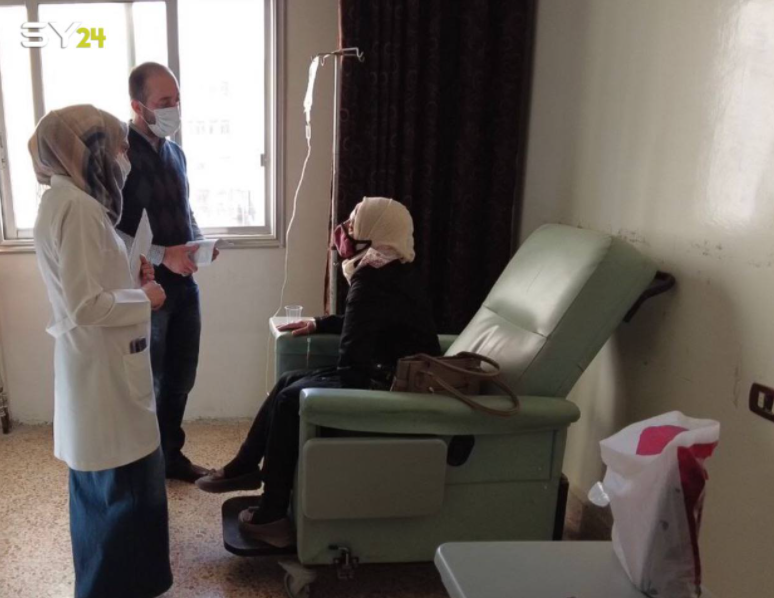Um Ahmed, a 40-year-old resident of Idleb, is undergoing the necessary stages of treatment for breast cancer, which has plagued her for several months. She is doing so in the cancer oncology department of Idleb Central Hospital. The cancer center opened four years ago, in November 2018, and is the only center in northern Syria that deals with the illness.
“I felt a lot of pain in the armpit area. I had many tests showing that I had breast cancer, which gave me clarity. I then underwent surgery and had a mastectomy, which was the beginning of a very painful treatment journey for me. I was able to get my condition monitored at the center,” Um Ahmed said in an interview with SY-24, describing her treatment journey.
The presence of the Cancer Treatment Center, for Um Ahmed and hundreds of other cancer patients in northern Syria, has reduced many burdens. These include expenses that many of them cannot afford, let alone the pain of enduring the disease, treatment stages, surgical work, and doses of medication.
Ayham Jammo, a hematologist, oncologist, and director of the Idleb Oncology Center, talks about the importance of early detection of breast cancer in boosting recovery prospects, reducing the amount of medication needed, and cutting down the overall period of treatment.
“Early detection in women at home begins with regular awareness and self-examination. If there is any marked change to the body, skin, or nipple shapes, you should go directly to the oncology center for the relevant tests,” he tells SY-24 in an exclusive interview.
Read Also: Health Ministry Warns of Omicron and Invites Adults to Receive Vaccine
“Since the center’s inception, the number of breast cancer patients has been around 400, who have been treated free of charge. Every month, we receive 30 newly diagnosed patients to undergo treatment,” said Dr. Ayham.
The presence of a cancer treatment center in the Idleb governorate has helped thousands of patients to receive treatment within their home communities without the need to endure the hardship of traveling to Turkey or regime-controlled areas to continue treatment, as was the case for them before.
“My financial situation is very bad. After we were forced out of Jabal al-Zawiya and lost everything we had, the cost of treatment became stressful for my family, especially with the poor living conditions that people are enduring today,” says Um Ahmed.
The center provides hundreds of patients with free treatment for specific types of tumors, such as breast cancer patients, colons, blood lymphoma, and leukemia in children. The doctor noted that the center is currently working towards introducing treatments for other types of cancer as soon as possible.
SY-24 held an exclusive interview with the hematologist and oncologist Basel al-Atassi, a member of the Syrian Medical Association (SAMS) and supervisor of the Treatment Center of America. Atassi said: “The center’s importance lies in its coverage over a large geographical area, with a high population density of more than four million people. The center has become the main refuge for hundreds of cancer patients of various tumors, and has carried out diagnostics, treatment, follow-up, and medication provision at various stages.”
“The center filled a major gap caused by the conditions of war, siege, and border closure in Idleb. The center has continued operating despite challenges and limited resources,” he said.
The center will add a new service for patients—the Pathology Service—which helps diagnose cancer. Dr. Atassi assured SY-24 that the center will also soon provide an immunology program and mammogram technology (the device used for early detection of breast cancer).
The center is supervised by a specialized staff of four hematologists and oncologists, a pharmacist, and a roster of nursing staff. The staff receives about 1,000 patients per month and provides free consultations to all cancer patients.
According to October 2021 statistics, the center completed 1018 reviews, with 109 of those being first-time reviews. A total of 78 cancer patients were newly diagnosed, while the center administered 460 doses of medication.
This article was translated and edited by The Syrian Observer. The Syrian Observer has not verified the content of this story. Responsibility for the information and views set out in this article lies entirely with the author.


